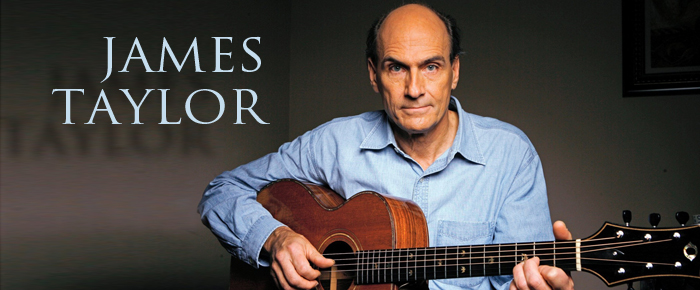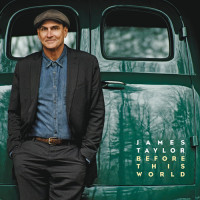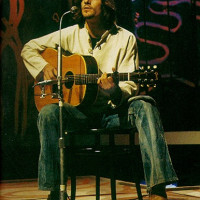
By Eleni P. Austin
The Bitch Goddess who writes this column rarely addresses anything from a first person perspective. Her argument is you know she wrote it, therefore it’s probably her opinion you are reading. To paraphrase George Harrison, too much “I, Me, Mine-ing.” But this time, it can’t be helped, so she begs your indulgence.
I got my first grown-up record when I was seven years old. Until then, I subsisted on a diet of my mother’s records, (Greek music and Jazz) along with Disney and Hanna-Barbera story records and my beloved Chipmunks Sing The Beatles album. But my cousin Sheila consistently played a cassette in her car that she knew I loved, so she bought me James Taylor’s Sweet Baby James LP for Christmas.
I wore that record out. I studied the cover, slightly crushing on JT and coveting his simple blue work shirt. I read the liner notes, learning the names of musicians who would become companions throughout my childhood as they popped up on subsequent albums.
My jams turned out to be deep cuts like “Blossom” and “Suite For 20 G.” After a while I needed to attach a penny to the stylus of my Kenner Close n’ Play, otherwise Sweet Baby James would skip.
Thus began a life-long love of James Taylor; even when my Osmonds obsession briefly eclipsed it; even as I discovered Led Zeppelin, Joni Mitchell and ultimately Punk Rock and even when he started going bald. His songs are like musical comfort food.
Obviously I am not alone. James Taylor has had this same effect on millions of women, and a few men. He kind of invented the sensitive Singer-Songwriter genre. Pretty good gig for a guy who checked himself into a mental institute as a teenager, and then struggled with assorted addictions until the early ‘80s.
James Taylor was born in Massachusetts in 1948 to Isaac, a physician, and Gertrude, a singer with operatic aspirations. The second eldest of five children, James showed an early affinity for music learning cello and then piano and guitar.
The family relocated to Chapel Hill, North Carolina when James was three. Along with his sister Kate, and brothers Alex and Livingston, he enjoyed an idyllic childhood in a tranquil, rural setting. The Taylors summered at Martha’s Vineyard. It was there he met budding guitarist Danny Kortchmar. Over successive summers the duo worked up an act, James began writing songs and they would perform as James & Kootch.
By high school, James was attending Milton Academy, a prep school in Massachusetts. By his junior year he was experiencing serious depression, so he spent his final year of high school back in Chapel Hill. He recorded some music with his brother, Alex but his despondence deepened. Finally he checked himself into the McLean Hospital in Massachusetts. In later years he considered his nine months there as a “pardon or reprieve.” It certainly kept him from serving in Vietnam.
After McLean, James moved to New York City intent on a career in music. Reconnecting with Danny Kortchmar, they recruited drummer, Joel O’Brien and bassist Zachary Wiesner and formed Flying Machine. Gigging around Greenwich Village they were making a name for themselves with performing James’ original songs. Unfortunately, James developed a debilitating heroin addiction. Ultimately, he reached out to his father, who got him into a treatment program.
After receiving a small family inheritance, James relocated to London, England. Danny Kortchmar put him in touch with Peter (as in Peter & Gordon) Asher, who was working as an A&R scout for the Beatles’ Apple Records. He was signed, as the first non-British musician signed to the label.
He began recording at Abbey Road while the Beatles were making the White Album. Paul McCartney and George Harrison played on “Carolina On My Mind,” and George co-opted James’ title “Something In The Way She Moves” as the opening line for his song “Something.”
His self-titled debut was released in late ’68 in the U.K. and early ’69 in the U.S. It received positive reviews, but James wasn’t able to promote the album. While he was in London he started using heroin again. He returned to the U.S. and checked himself into a treatment center in Stockbridge, Massachusetts.
By the Summer of 1969, James Taylor was headlining a six-night stand at the Troubadour. He signed with Warner Brothers Records and was writing what would become Sweet Baby James. That album arrived in 1970 and shot to the top of the charts. The first single, “Fire And Rain,” a song detailing the suicide of a friend, perfectly matched the Country’s post-‘60s malaise.
For better or worse, James Taylor became the face of the sensitive singer-songwriter movement. Cat Stevens, Jackson Browne and others carried the torch, but James owned that appellation throughout the ‘70s. His 1971 follow-up, Mud Slide Slim And The Blue Horizon was also a critical and commercial smash, buoyed by his version of Carole King’s “You’ve Got A Friend.” By the end of the year he had married singer-songwriter, Carly Simon and everything seemed perfect.
Musically, everything James Taylor touched turned to gold during the “Me Decade” Even when albums like One Man Dog and Walking Man, didn’t rocket up the charts, they still performed respectably.
In between guesting on Carly Simon’s records, (they’re version of “Mockingbird” on her Hotcakes album, shot to #1), He released three critical and commercial juggernauts, 1975’s Gorilla, 1976’s In The Pocket and 1977’s J.T. He closed out the decade with the uneven Flag record.
Despite all the success and the picture-perfect family, (James and Carly had two children, Sally and Ben), he couldn’t out run his demons. James quietly continued to battle substance issues through the early ‘80s. After the release of his 1981 album, Dad Loves His Work, he began to speak publically about his struggle. He and Carly separated and divorced by 1985, the same year he released the tepid That’s Why I’m Here.
Throughout the ‘80s and ‘90s, James Taylor burnished his legacy by touring each summer. Baby Boomers who grew up with him began introducing his music to their kids, creating a continuum of new fans. He sporadically released albums, Never Die Young, New Moon Shine and Hour Glass arrived in 1988, 1991 and 1997. Each was pleasant, but not essential.
After dating for six years, he married Caroline Smedvig in 2001. The couple welcomed twins, Rufus and Henry, later that year. His October Road record came out in 2002. He has spent the ensuing years guesting on other people’s albums, and touring. He recorded the obligatory Christmas album and released two albums of cover songs unambiguously titled Covers and Other Covers.
Now James Taylor is back with Before This World, his first album of original music in 13 years. It opens with the bucolic “Today Today Today.” Powered by fiddle, harmonica and some gritty guitar, the song serves as an intro to the record. The rhyming couplets that indicate he’s getting his shit together are surprisingly jejune; “The bird is on the wing, the bell is about to ring, the big girl she’s about to sing.” Ugh. But, he also delicately alludes to the hardships he has endured. “Somehow I haven’t died, and I feel the same inside as when I caught this ride.”
Both “Stretch Of The Highway” and “Montana” celebrate the yin yang of life on the road. The former a rollicking soul jam anchored by a punchy horn section. James extols the life of a traveling musician, “And my favorite thing is to miss my home, when I’m gone, soon as I’m gone.” His mien is salacious and playful, as he notes “Chicago’s got the finest high-test, first-class poontang anywhere.” Okay, um, duly noted.
The latter is a loping waltz wherein this weary road warrior is longing for the comforts of home. A slow-down in Montana is a wistful dream; “Who can imagine the scale of the forces that pushed this old mountain range up in the sky/Tectonic creation, erosion, mutation, something to pleasure God’s eye.”
Two songs offer a window into the very private world of James Taylor. “You And I Again” is a heartfelt love song to his wife. Yo-Yo Ma’s adds tremulous cello colors to this graceful piano ballad, as James notes “surely we have it all.”
“Angels Of Fenway” is a fun-loving ode to his beloved and beleaguered Boston Red Sox. His devotion began as a child with a grandmother who was born in 1918 when the Sox won the World Series, and she was still cognizant for their 2004 triumph. Unfortunately the song gets slightly sappy with the addition of chorale-style backing vocals.
James really steps in the shit with “Snowtime.” The melody is a blatant rip-off of his ‘80s hit, “Only A Dream In Rio,” and it’s the whitest white-boy samba ever. It’s an attempt to be laid back, Latin and lilting, but the rhymes are dodgy, and there’s weird immigration sub-plot that is introduced and abandoned. Out of nowhere, a Parisian accordion and timbales are thrust in the mix. It’s a bad case of musical schizophrenia.
The best song on here is pointedly political. Although James Taylor has always championed liberal causes, he rarely voices those beliefs in his music “Far Afghanistan,” Offers a sharp character study of a young soldier from Indiana, preparing to enter a perpetual war zone. The melody’s foundation is built on a martial cadence and the modal, Middle Eastern verisimilitude is accomplished by threading a shehnai, (an oboe native to India), through the mix
The lyrics offer a wry reminder that America has been occupying Afghanistan almost 15 years, but the country has been war- torn for generations. “They fought against the Russians, they fought against the Brits, they fought old Alexander, talking ‘bout him ever since/And after 9-11 here comes your Uncle Sam, another painful lesson in the far Afghanistan.”
Other sort-of interesting tracks include the rippling, back porch ramble of “Watchin’ Over Me” and the title track. “Before This World/Jolly Springtime” features the dulcet backing vocals of Sting and the cello charms of Yo-Yo, the first part of the song is a quiet benediction, but the second half is a Ye Olde English-y Elizabethan roundelay that wouldn’t seem out of place in “Spam-A-Lot.” The album closes with a sweetly faithful reading of the old Folk favorite, “Wild Mountain Time.”
I wanted to love, love, love this record. But honestly, it’s kind of dullsville. Sometimes great art is fueled by great pain, clearly that was the case with Sweet Baby James.
It’s wonderful that James Taylor has moved past the crippling emotional agony that characterized his youth. He no longer needs to medicate the pain away. He seems pretty happy. This album is a massive success, debuting at #1 on the Billboard charts. Before This World isn’t unpleasant. But it isn’t essential. However, you do get to hear James Taylor say “poontang.”













































